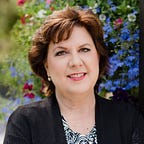Self-Confidence Doesn’t Have to Wait for the Perfect Day
Educational psychologist Michele Borba had a light bulb moment after years of teaching at-risk kids: “Thrivers are made, not born.”
Borba compiled research about traits differentiating children who flourish from those who don’t and discovered seven essential qualities:
- Self-confidence
- Empathy
- Self-control
- Integrity
- Curiosity
- Perseverance
- Optimism
When you consider the list, do you see the one thing they have in common? They’re all soft skills. You might be thinking, That’s fine for little kids just starting, but no one taught me early. How will I ever catch up?! Don’t worry — in the June series, Three Ways to Thrive with Soft Skills, you’ll learn how to use soft skills to flourish.
Let’s start with the top of the list: Self-confidence. Everyone likes a self-confident colleague or leader, but do you wonder how you can be self-confident without being a social media influencer, having the body you see in ads, or the swagger of a character on “Billions”?
Here’s the surprise: Those external factors aren’t as important as you might think. Michele Borba discovered that self-confidence comes from learning how to bounce back after hard times, not having an endless series of high-profile wins. She stated, “Most parents equate self-esteem with self-confidence. They tell their kids, “You’re special” or “You can be anything you want.” [But] Kids who have self-assuredness know they can fail but also rebound.”
Borba’s finding that resilience and character are vital flips the bit on what self-confidence is. It means self-confidence can be present all the time — it isn’t limited to times when you celebrate big achievements or get your way (which are fleeting, at best). The grown-up version of self-confidence is being stable and secure about your identity, even on the not-so-great days.
Create a Personal Definition of Self-Confidence
Customer Success Manager Joshua Eden is cultivating a new kind of self-confidence by abandoning society’s unrealistic expectations, especially about timing. Here’s what he wrote on LinkedIn:
“I turned 33 yesterday, and I don’t:
· Own a house
· Make six figures
· Have a child
· Have clear skin
· Have a six-pack or any sort of pack
· Totally know what I am doing with my life
And I am still happy.
Happy that trauma I have silently been enduring for 19 years has finally come to the surface for me to work on. Happy to have friends and family that have stuck around me while I worked on myself and didn’t have much I could give to them.
More importantly, I’m happy that I’m learning to slowly let go of the idea that my value and worth are only tied to my usefulness to others.”
How Soft Skills Can Help You Thrive
Can you relate to Joshua Eden’s comment about only feeling valuable and self-assured when you’re useful to someone else? Me, too!
But that doesn’t mean you have to put self-confidence on hold while you’re waiting for things to fall into place. Instead, you can follow Joshua’s lead and use soft skill How tactics like discernment and empathy to build a new, personal definition. For instance, did you notice how he was compassionate about his journey? And how he gave himself credit for bouncing back from tough situations?
Doubts, setbacks, and learning curves will happen. But you can keep your self-confidence intact and ease the stress of those situations by sketching out simple turnarounds.
Here are a few starter sentences to spark your thinking, but of course, make up your own! For example:
Self-confidence doesn’t have to wait for a perfect day. Leave false versions like showing off and swagger to someone else, and redefine self-confidence so you can thrive.
